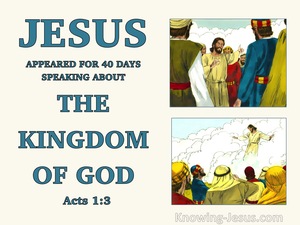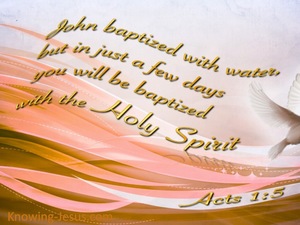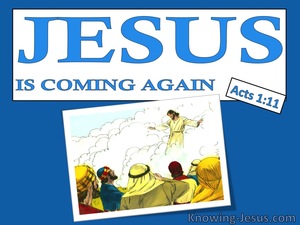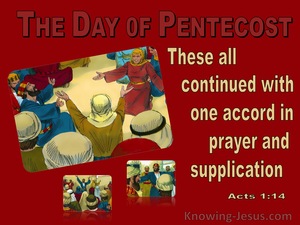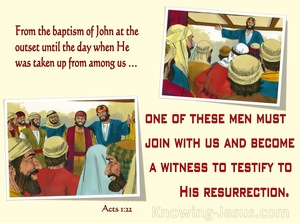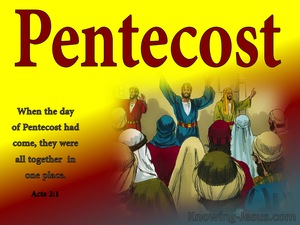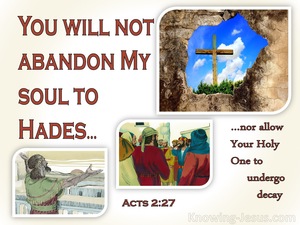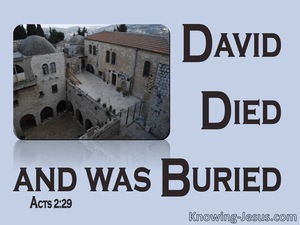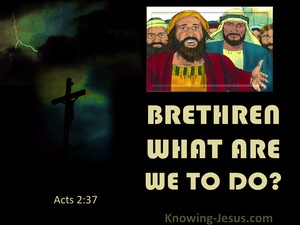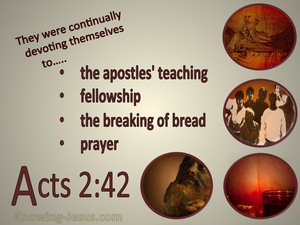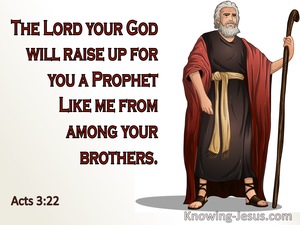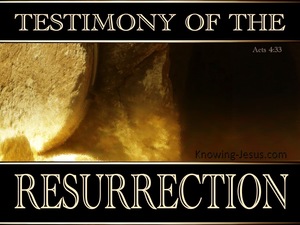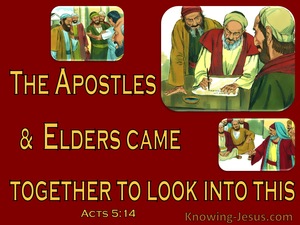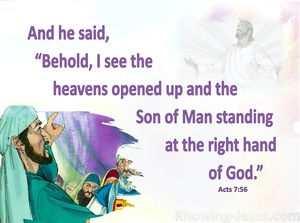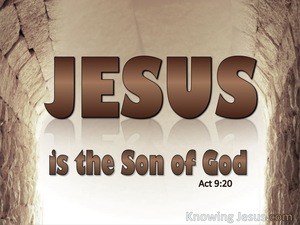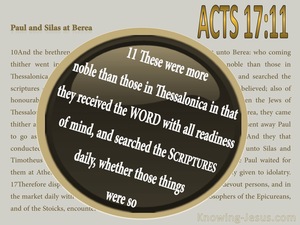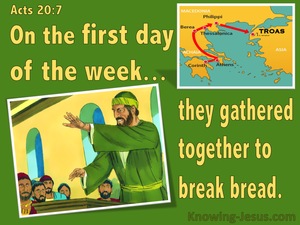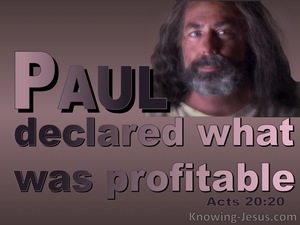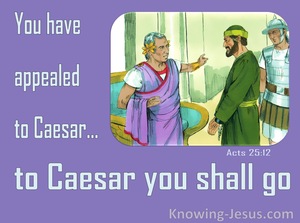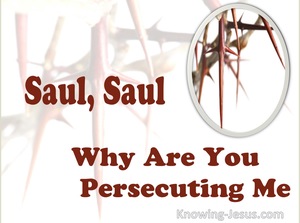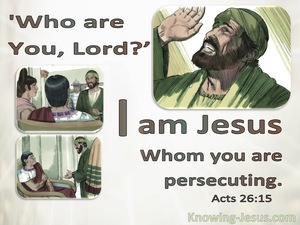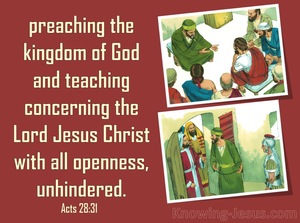◄ Acts Devotional Commentary ►
Acts 1:1
Although the book of Acts is often described as the acts or actions of the apostles in the fledgling Christian church, this volume of Scripture would more accurately be called the continuing acts or undertakings of the Lord Jesus Christ.
Luke in his Gospel, described all that the Lord Jesus began to do and teach in His earthly ministry and he also put on record, in the book of Acts, all that Jesus continued to do and to teach. But read more...
Acts 1:3
Jesus was the promised Messiah Who was to break in pieces the kingdoms of this world and set up His Millennial Kingdom upon the earth, with God's chosen people, Israel, as the head of the nations and not the tail. Jesus had come to set up His earthly kingdom, but first He was to suffer and die for the sin of the whole world, for before the establishment of His earthly reign in Jerusalem, Jesus must also become: "The Lamb of God Who takes away the sin read more...
Acts 1:4
For forty days after His Resurrection from the dead, the Lord Jesus appeared to many of His disciples and followers, speaking of things concerning the kingdom of God. No doubt He touched on the future Millennial Kingdom where one day He will rule and reign as King of kings and Lord of lords. But also He would probably make the same shrouded references to the coming Church age, which can be seen in certain gospel passages.
Christ read more...
Acts 1:5
Before the Cross of Calvary, the people of Israel were called by John to turn from their sins because the promised Messiah of God had come. John's was a baptism of repentance specifically targeted at Israel, because Jesus their King was in their midst and they were to turn from their sins. First, they were to repent of their sins because the kingdom was near, for the King was present. Though John may not have fully understood, he prophesied that at a future time read more...
Acts 1:6
Jesus was just about to go to His Father in heaven and had just reminded His disciples that after He ascended to the right hand of the Father, He would send His promised Holy Spirit to indwell them forever, and to guide them into all truth.
They were to be His witness to a lost and dying world that salvation is available to all who would believe on Christ for the forgiveness of sins. They would tell the world that by faith, they read more...
Acts 1:7
The Old Testament Scriptures promised the nation of Israel a literal, earthly kingdom, the boundaries of which would far exceed those which had been secured in the golden days of David and Solomon.
Jesus Himself had promised His chosen apostles that when the Son of Man sits on His glorious throne in the kingdom of God, they too would be seated on 12 thrones judging the 12 tribes of Israel, while prophets like Isaiah, Ezekiel, read more...
Acts 1:8
Jesus died once and for all as the sacrifice for man's sin, and rose as living proof of His claims to be Israel's Messiah and Saviour of the world. Before the Cross, men could only approach God through Israel. After the Resurrection, the Church (which is the Body of Christ) were to be His witnesses on earth. Their testimony was to start in Jerusalem and spread out from that point. Indeed, Jesus had commanded them not to leave Jerusalem, but to wait for what the read more...
Acts 1:9
Following forty glorious post-Resurrection days, the risen Lord Jesus led His little band of disciples out from the tiny town of Bethany to the beautiful Mount of Olives, where He spoke to them for the very last time before being taken from them, into heaven. It must have been a time of confusion and expectancy, for His words were those of a dearly loved friend Who was bidding His precious followers farewell, for: "After He had said these things, Jesus was read more...
Acts 1:10
Following forty glorious post-Resurrection days, the risen Lord Jesus led His little band of disciples out from the tiny town of Bethany to the beautiful Mount of Olives, where He spoke to them for the very last time before being taken into heaven. It must have been a time of such expectancy tinged with hesitancy, for His words were those of a dearly loved friend bidding His precious followers farewell.
And so, lifting up His read more...
Acts 1:11
How important it was that the Lord Jesus ascended into heaven at the end of His earthly ministry, for only then could He send the indwelling Holy Spirit as the seal of all God's promises to those who believe on Him.
How wonderful to realise that in returning to heaven He would take up His twofold ministry as our great High Priest interceding to the Father on our behalf and also our heavenly Advocate and Mediator between God and read more...
Acts 1:11
We have not been appointed to gaze on the Word of God without understanding, or in a frightened, astonished, or perplexed way, as did His disciples when the Lord Jesus Christ ascended into heaven. We now have a more-sure Word of prophecy which informs us of our unshakable hope in God's plans and purposes for our future.
Despite all that Jesus had taught the apostles during His earthly ministry, and even though He opened the read more...
Acts 1:14
God's people are to be a praying people, united in Spirit and love, for we are one body with one hope, one faith, one gospel, one Lord - one God and Father of us all. As the disciples of Christ waited for the promise from the Father, "they were all together, with one mind. They were continually devoting themselves to prayer, along with the women, and Mary the mother of Jesus - and His brothers." What a beautiful picture of the redeemed of Christ, obeying read more...
Acts 1:22
In his Gospel, Luke wrote down all that Jesus began to do and teach during his earthly ministry, describing His birth, life, death, burial, and rising from the dead. He also described post-Resurrection appearances, when the Lord Jesus presented Himself alive to His followers by many convincing proofs for 40 days, during which time He taught about the kingdom of God and presented Himself as Israel's promised Messiah. The good doctor continued his treatise in the read more...
Acts 2:1
For ten days, the disciples had been without the Lord Jesus since His Ascension into heaven, following His sacrificial death and glorious Resurrection from the dead. It had only happened about fifty days earlier, but those three days from Passover to the Feast of Firstfruits, would be forever etched in the hearts and minds of all of Christ's followers.
During those exciting weeks that followed, Jesus presented Himself alive to read more...
Acts 2:2
There are some astonishing mysteries to discover and some wonderful truths to explore about the Person and work of the Holy Spirit, in the lives of all believers. The book of Acts gives us some great insights into the ministry of the Spirit within the corporate Body of Christ, as well as the lives of believers, individually. While the focus of the Gospels is the Lord Jesus, it is the Holy Spirit Who is the central character in the book of Acts.
read more...
Acts 2:4
It must have been a sight to behold that first day of Pentecost, when the Church was born and the Holy Spirit came to take up residence within the bodies of these first Church-age believers for the very first time.
Just before He ascended into heaven, the Lord Jesus Christ's instructed His disciples not to leave Jerusalem, but to wait for what the Father had promised: "They would all be baptised with the Holy Spirit," read more...
Acts 2:17
It must have been wonderful to be all together in one place on that first day of Pentecost, when the Church was born. Believers were baptised into the Body of Christ, filled with the Holy Spirit, and all received the gift of tongues. But how the joy they expressed was misunderstood, for we read that the people were perplexed and some misinterpreted their rejoicing about the wonderful works of God for drunkenness. But Peter was led by the Spirit to apply a prophecy read more...
Acts 2:20
On the day of Pentecost, when faithful believers were united together in one place, filled with the Spirit, baptised into the Body of Christ, and started proclaiming the wonderful works of God in many languages, Jews and Jewish proselytes from around the world were amazed to hear the gospel in their own tongue, and were perplexed. They wondered what had happened and some even mockingly suggested that the believers were drunk!
read more...
Acts 2:21
It was the prophet Joel in his famous passage about the end times, which was partially quoted by Peter on that first day of Pentecost: "And it will come about that whoever calls on the name of the Lord will be delivered." The verse in Joel continues: "For on Mount Zion and in Jerusalem there will be those who escape, as the LORD has said, even among the survivors whom the LORD calls."
This read more...
Acts 2:22
Christ's ministry in the gospel of Luke, began with His Baptism by the Spirit in the Jordan, when the heavens opened and the Holy Spirit, in the form of a Dove, descended and rested on Christ. Similarly, it is the Baptism of the Spirit in the book of Acts that marks the start of the Christian Church at Pentecost, when the 120 souls were filled with the Holy Spirit and began to speak in other languages, as the Spirit enabled them.
read more...
Acts 2:23
The book of Acts in general is a history book that bridges the pre-Cross Scriptures of the Old Testament and Gospels (when the gospel of the kingdom was the main focus of teaching), and the post-Cross period when God's full revelation to man had been given through Christ Jesus (when the gospel of the grace of God became the main focus of God's good news to all men).
The book of Acts in general is a history book with minimal read more...
Acts 2:24
What a thrilling message Peter had for the men of Israel on that wonderful Day of Pentecost when the Church was born, and all those present were baptised into the Body of Christ and filled with the Spirit, Who took up permanent residence in their bodies and received the gift of languages. As Jews and Jewish proselytes from around the world witnessed the amazing happenings, Peter stood up and delivered a sermon to which thousands responded on that day, and millions read more...
Acts 2:26
What an incredible spectacle must have taken place on the day of Pentecost, when believers were filled with the Holy Spirit. What an amazing scene it must have been when Christ's followers began to proclaim the wonderful works of God in a multitude of languages, and Peter was empowered to deliver his great sermon, calling the people of Israel to faith in their promised Messiah, the Lord Jesus Christ.
How appropriate that he read more...
Acts 2:27
The birth of the Church at Pentecost with the descent of the Holy Spirit, began a new dispensation in God's administration. Before the Cross, the only way to approach God was through Israel and their sacrificial system, as laid down in the Mosaic Law. Following Christ's sacrifice on the Cross, where Jesus voluntarily took upon Himself the sin of the world, God changed the way He met with humanity. While His plan of redemption never altered, God began dealings with read more...
Acts 2:29
When the Christian Church was birthed at Pentecost, Peter stood up and addressed the men of Israel and Jewish converts. He told them that Jesus of Nazareth, Whom they all witnessed performing many mighty miracles through the power of God, was the promised descendent of king David, and that He was to sit on the throne of His father, forever. But what was the significance of Paul's confident statement read more...
Acts 2:32
Having been baptised into the Body of Christ, filled with the Spirit, and indwelt by His holy Presence, Peter was empowered by God to deliver his message to the men of Israel, following that unique day of Pentecost. Peter used the Hebrew Scriptures to attest to the truth that Jesus is God's Messiah and cited His glorious Resurrection as biblical proof, for it was impossible for Christ to be held captive by death, because death is inconsistent with deity, for within read more...
Acts 2:33
People living at the time of the Cross experienced both pre-Cross and post-Cross teachings and had to go through the painful transition from Law to grace, as they moved from a dispensation based on the Mosaic Law to living in the post-Cross Church age.
The day of Pentecost was the beautiful birthday of the Church when the Holy Spirit, Whom Jesus had promised to send only a short time earlier,, was poured out on all the believers read more...
Acts 2:37
The everlasting story of redemption began to be implemented in the garden with the fall of man. The wonderful story of redemption is picked up by Peter following the death, burial, Resurrection, and Ascension of the Lord Jesus.
The promised Holy Spirit had been sent from heaven to indwell and empower all who believe. The same cowardly men who had fled from Gethsemane and denied their Lord only 50 days earlier were suddenly read more...
Acts 2:38
Over three years before he stood up on the day of Pentecost and cried out to the men of Israel: "Repent, each one of you and be baptised," Peter had witnessed John the Baptist delivering the same message of repentance to the same lost sheep of the same house of Israel: "Proclaiming a baptism of repentance for the forgiveness of sins."
For centuries, many prophets had been calling the erring read more...
Acts 2:41
Throughout the ministry of John the Baptist, and for the three and a half years of Christ's earthly ministry to the lost sheep of the house of Israel, Israel was being called to repent of their sins once again. They were warned to turn from their evil ways and return to God because their Messiah was in their midst. Indeed, for many hundreds of years, the cry of Jewish prophets had been 'repent'. The people of Israel were to change their outlook, to change their read more...
Acts 2:42
As members of Christ's Body, we are living in a season of history that both angels and the prophets desired to look into; a season when God's revelation to the Church is speedily hastening towards its close. We are living in an age when the Lord Jesus Himself is shortly going to return in the clouds to take us to be with Himself, forever. We are also fast approaching the day when the Lord Jesus Christ will finally return to earth with all His saints and set His read more...
Acts 3:13
For multiple centuries, the prophets of old had foretold of a coming Messiah Who would save His people from their sins. He would be a descendent of Abraham, Isaac, Jacob, and David... and it was foretold that He would herald in a wonderful time of peace and prosperity for His people, Israel.
Throughout the Scriptures, He was given many names and multiple titles, and in the book of Isaiah, He was identified as 'God's Servant'. In read more...
Acts 3:19
Israel were God's chosen people who were called to proclaim the good news to the nations, but they failed and fell into apostasy. Despite prophetic calls for Israel to repent and turn back to the Lord, their hearts remained hardened and their eyes were blinded to the truth.
John the Baptist was Israel's final prophetic voice. He was the fore-runner of the Lord who urged God's chosen nation to repent of their sins for the kingdom read more...
Acts 3:22
A great change took place in God's dealings with mankind after the Resurrection and Ascension of the Lord Jesus Christ. Before the Cross, people were living under the Law and looking forward expectantly to the coming of their Messiah; the hope of all nations Who would save His people from their sin. But at His crucifixion and Resurrection, Christ, the Passover Lamb and final Sacrifice for sin, was offered for us, such that all who believe in Him will not perish but read more...
Acts 3:26
God chose Israel to be the nation through whom He would save man. But they sinned and throughout the Old Testament, Israel was called on by the prophets to repent and turn from their evil ways. Jesus was sent to the lost sheep of the house of Israel, and John the Baptist called upon Israel to repent nationally, turn from sin, follow their Messiah, and fulfil their original calling to tell the world of God. But they crucified their King. At Pentecost, we once again read more...
Acts 4:8
It was on the day of Pentecost that Christ's amazing promise was fulfilled: "John baptised with water," Jesus told them, "but you will be baptised with the Holy Spirit, not many days from now."
It was only ten days later, that Christ's promise was fulfilled. His faithful followers, who obeyed His instruction to wait in Jerusalem for the Promise of the Father "were gloriously read more...
Acts 4:12
The world at large and man in particular, has for thousands of years been on a desperate search for meaning in life for love, health, peace, prosperity, youth, beauty, and for a perfect dwelling place of eternal bliss and over-abounding happiness. Humanity as a whole and each individual personally, is looking for salvation from the evils of this world. Each one longs to escape the pain, suffering, and disappointments that are the inevitable product of a fallen race read more...
Acts 4:31
Being baptised into the Body of Christ, sealed by the Spirit of God, and having Him take up permanent residence in our mortal body, are some of the wonderful ministries that take place the moment a sinner believes in Christ and trusts the Lord Jesus for the forgiveness of sins and eternal salvation.
These supernatural ministries occur once in the life of every believer at the point of salvation. They change our relationship with read more...
Acts 4:33
Too often, we look at the great power with which the apostles in the early Church gave testimony of the Lord Jesus Christ and the abundant grace which they received from God in their powerful witness, and bemoan the fact that this is no longer the case today. So what was so different about the inspiring testimony of the early Church, compared with the ineffectiveness of present-day believers?
One significant difference is that the read more...
Acts 5:3
One of the hallmarks of the fledgling Christian Church, was that they moved in the power of the Spirit and great grace was upon them all. Now, although the Holy Spirit was already indwelling those that were saved, the full canon of Scripture had yet to be written and certain elements of their practice, including communal living, were a hallmark of these early believers.
Times were hard during these opening days of the church. read more...
Acts 5:14
The early Church had to overcome some serious challenges. They had to come to terms with moving from the pre-Cross period of the Law to the post-Cross dispensation of the grace of God. They had to come to an agreement on their set of beliefs and the gospel they were to teach, if the Christian Church was to survive.
Before the Cross, sin was temporarily covered, year by year, until the Messiah came to redeem Israel. The promised read more...
Acts 5:15
Three thousand people were saved on the day of Pentecost, and so powerful was the gospel that Peter and the other apostles taught, that the numbers of Christian converts grew with each passing day. Not only did they preach the good news of Christ's death, burial, and Resurrection, and open up the Old Testament Scriptures to the people of Israel, but they also healed many sick people in those early days of the Christian Church.
We read more...
Acts 6:7
Jesus instructed His disciples to go into all the world and preach the gospel to every creature, Jew and Gentile alike. He also informed them that they would be His witnesses in Jerusalem, Judaea, and to the uttermost parts of the earth. Once the Church was founded on the feast of Pentecost, their witness began in Jerusalem, but it did not expand beyond that region.
The early Church in Jerusalem was made up of two Jewish read more...
Acts 7:5
Following Israel's rejection of their Messiah and the birth of the Christian Church at Pentecost, God's chosen nation fell into two camps: those that accepted Christ as their Saviour and those that rejected His offer of salvation.
Tensions between the two groups increased so significantly that the religious, Jewish leaders who rejected their Messiah, took steps to suppress the testimony of God's grace by exterminating everyone who read more...
Acts 7:48
Just before being stoned to death for his faith in Christ, Stephen (a beloved disciple of the Lord Jesus, who was full of grace, truth, faith, hope, power, wisdom, and filled with the Holy Ghost), was falsely accused by various groups of religious legalists of sedition and blasphemy, and hauled before the Jewish court; the Sanhedrin.
And so it was that starting with Abraham's call out of Ur of the Chaldees, that Stephen presented read more...
Acts 7:51
The climax of Stephen's inspired speech to the Sanhedrin, just before his cruel martyrdom, rehearsed the faithfulness of God towards His people while contrasting Israel's rebellion against their God, causing him to conclude: "You stiff-necked people, uncircumcised in heart and ears, you always resist the Holy Spirit. As your fathers did, so do you."
The Spirit's work in the world today is to convict the unsaved read more...
Acts 7:56
Stephen was a young man who converted to Christianity at the start of the Church age and was given a leadership role because he was filled with the Holy Ghost and imbued with godly wisdom. He was full of faith and power, and Stephen performed great wonders and miracles among the people, causing many to come to faith in the Lord Jesus Christ.
There were certain leaders in the synagogue who were displeased with his teaching and read more...
Acts 7:57
Stephen was a man of God who was full of integrity and brimming with faith. He was one of seven men who were chosen to oversee the daily ministrations in the early Church, because he was faithful, honourable, and filled with the Holy Spirit.
In those early days of the Church, Stephen carried out great wonders and miracles among the people. The Church of God and those that followed Christ, were hated in those early days, and on a read more...
Acts 7:59
God the Father was rejected by the people in the Old Testament and yet God in His grace sent the eternal Son to be the propitiation for the sin of the world. But God the Son was also despised. He was rejected and crucified by those he came to save. And although His propitiatory work on the Cross stands fast for whoever believes on His name... the Lord Jesus returned to heaven for a season and God the Father sent God the Holy Spirit as the Heavenly Comforter to read more...
Acts 7:60
Stephen was the first Christian martyr... and the final words we hear him speak are very reminiscent of words that Christ spoke on the Cross. Like the Lord Jesus, Stephen had been despised, rejected, outlawed, and falsely tried by the proud Jewish leaders. He spoke the truth, in the power of the Holy Spirit, and yet they would not listen.
It is sobering to reflect on centuries of Israel's rejection of God and their apostasy read more...
Acts 8:37
As God's chosen people, Israel believed in the Lord their God with Whom they had made a covenant at Sinai. They also believed in the Holy Spirit of God and witnessed Him working through certain prophets, priests, kings, and other selected individuals - although, during Old Testament times, the Holy Spirit did not indwell His people permanently... He was selective and temporary.
For centuries, Israel had believed in a coming read more...
Acts 9:1
As Jesus prepared to leave His disciples, He told them that they would proclaim the good news of the gospel of Christ throughout the world. They were to become His witnesses in Jerusalem, in all Judea, throughout Samaria, and to the uttermost parts of the earth.
The stoning of Stephen, who was the first Christian martyr, set the course for the rapid spread of the good news of salvation to faraway regions as men, women, and read more...
Acts 9:4
Who could have been a more deeply religious man than Saul of Tarsus? And yet his fervent zeal was counter to the will of God. Who could have been a more passionate hater of Jesus of Nazareth than this exemplary Pharisee? Yet he became Christ's most ardent admirer, worshipping the Lord Jesus in grateful reverence and submitting to the Nazarene as His bond-servant.
Paul had played havoc with the Church, entering into homes where he read more...
Acts 9:5
Saul of Tarsus was a deeply religious man and passionate about his service to God, and yet his work for God was in direct opposition to God. Despite Saul's fervent zeal to: "Work the works of God, he was suddenly brought face to face with the reality of Who God was - and it demolished all his preconceived understanding about God and shattered his long-held, pious religiosity.
Saul of Tarsus was a great man who read more...
Acts 9:16
Paul was God's chosen vessel to take the glorious gospel of salvation to the Gentiles. His ministry would not be an easy task, but one that would entail much hardship and suffering. Indeed, the catalogue of problems and persecutions that Paul endures in his ministry is almost without equal, for on numerous occasions he was imprisoned, beaten, whipped, and shipwrecked. He encountered dangers while travelling on land and sea. He was attacked by robbers, and read more...
Acts 9:20
Paul is a beautiful picture of the Body of Christ, which is made up of Jew and Gentile believers.
Paul was a Jew by birth and a Hebrew of the Hebrews. He was of the nation of Israel, of the tribe of Benjamin, and was tutored extensively in the Hebrew Scriptures.
Yet Paul was also a Gentile citizen by birth, trained in Greek philosophy and studied Roman law. And Paul became God's chosen vessel to read more...
Acts 9:31
Just as God the Father and God the Son work together in unbroken harmony and perfect love, to fulfil their unique functions within the Tri-unity of the Godhead, so also God the Holy Spirit, the third Person of the Trinity, works the work of God in flawless synergy with Father and Son, as each fulfil their respective roles and co-authored responsibilities.
All are Omnipotent, all are Omniscient, and all are Omnipresent. All are read more...
Acts 10:34
The disciples and apostles of Christ had to travel a very steep learning curve over a space of a few short years. As Jews, they knew they were a privileged race, for they had become the one and only nation with whom God had made a covenant: They were His people, and He was their God. And although they knew a promised Deliverer was being sent to save them, they only had temporal rescue from an earthly overlord in view, rather than the more expansive, all-inclusive, read more...
Acts 11:26
The word 'Christian' has been used since the days of the early Church, when those that trusted Christ for salvation were given this label to differentiate them from the rest of humanity. We are told: "The disciples were first called Christians in Antioch."
Antioch was a city in Syria, and the people were renowned for their sarcasm and cynicism. The label they attached to early Church believers was far from read more...
Acts 13:22
Israel was unique among the nations for they were God's chosen people and He was their King. Israel is still unique among the nations and remains His chosen people, but Israel rebelled against the Lord, desiring to be ruled like the Gentile nations in preference to living under God's divine leadership.
God granted their request and gave them Saul to be their king, but because of his disobedience God removed Israel's dashing but read more...
Acts 13:38
Generally, in the New Testament, the word 'brethren' is used to refer to our brothers and sisters in Christ, and in certain passages believers are also addressed as 'holy brethren'.
However, there are other times when 'brothers' or 'brethren' refers only to the physical decedents of Abraham, Isaac, and Jacob – circumcised in the read more...
Acts 15:39
Much as we gravitate towards teachings about humility and reconciliation, brotherly love, Christian unity, and God's 'golden rule', we are all fallen creatures and too often Christians whiplash their souls through petty arguments, unnecessary contentions, bitterness of spirit, or an attitude of self-righteous pride. Too often, Christian brothers and sisters permit their personal feelings and a touch of spiritual pride to fan a flame of disagreement with other read more...
Acts 16:30
Never was there a more vital question asked in the history of mankind than: "What must I do to be saved?" Never was a more gracious answer received, directly from the heart of God than: "Believe on the Lord Jesus Christ and you shall be saved."
Believe in Christ's shed blood as the full payment for your sins. Believe that He rose again the third day to break the power of death in your life, read more...
Acts 16:31
The question that was asked by that jailor at the prison in Philippi, is the foundational question that should be in the heart of everyone born into this world: "What must I do to be saved?" And the answer is equally fundamental: "Believe on the Lord Jesus Christ." We are to trust in the person of the Son of God, to put our faith in the one and only object that has the power to save - the Lord Jesus Christ - the only begotten Son read more...
Acts 17:11
Pastors in churches today, often encourage their congregations to: "Be like the Bereans." Paul writes of the Bereans' response to his gospel message: "They received the message with great eagerness and examined the Scriptures every day to see if what Paul said was true."
It is noble and wise to diligently search the Scriptures day by day and to carefully examine all that you are being taught by teachers and preachers, read more...
Acts 17:25
It was during his second missionary journey, while staying in the city of Athens, that Paul taught certain Epicurean and Stoic philosophers about the gospel of God and His great salvation – which is through faith in the death, burial, and Resurrection of the Lord Jesus Christ.
On his arrival at Athens, Paul's spirit was provoked within his breast, when he saw that the city had been given over to the worship of idols and false deities. Some of the read more...
Acts 17:28
Paul was opposing two ideologies when he challenged the men of Athens to consider their philosophy. All were atheistic, with some who hotly pursued the pleasures of life through sensual experience, whilst others favoured personal discipline and self-control, desiring to search out the truth. But whether their focus was on pleasure or discipline, all had their roots in pagan thought, and all were dead in their sins. The former enjoyed life without reference to God read more...
Acts 17:30
The Bible tells us that man was made in the image of God. However, down through the centuries and across cultures, we discover that man chooses to make gods for themselves, through the imagination of their own hearts. The biblical worldview is that man was created by God, but since Adam's fall when sin entered into the world and twisted man's thinking, it was man who started to create gods in their own image and to fashion idols of silver and gold, wood, and read more...
Acts 17:31
There is an urgency in the message that Paul delivered to the unbelieving pagans in the Gentile city of Athens, for some followed after the hedonistic philosophies which pursued pleasure rather than knowledge, while others were stoics pantheists who considered that wisdom lay in the total restraint of human emotions. Either way, the teaching that Paul gave in this city was unpalatable to these paganistic idolaters.
One of the read more...
Acts 19:2
When the Word is rightly divided, a mist of muddled confusion is lifted, and shrouds of misinterpretation are removed as the Spirit enlightens the mind. When Scripture is read in context, the temptation to modify meaning, corrupt the content, or falsify truth disappears, and enlightenment floods the heart.
Israel as a nation was corrupt to the core, and the Baptist called for national repentance. Christ their King had arrived and read more...
Acts 20:7
The life and times of the apostle Paul were fraught with difficulties and dangers and in this short segment on his third missionary journey, we read of a meeting that took place on the first day of the week, when the followers of Christ had gathered together to break bread. On this particular day, Paul ministered to this little assembly of Christians. Indeed, his extended message to them continued until midnight!
We discover that read more...
Acts 20:20
While Paul's epistles were written to specific people or church communities to teach doctrine, give reproof, provide correction, deliver encouragement, impart instruction in righteousness, and give guidance in Christian living, the book of Acts could more accurately be described as a historical document.
The first chapters of Acts, record read more...
Acts 20:21
Paul's third missionary journey was around Asia Minor and Greece, and in Acts 20, we discover he was eager to give encouragement to different groups of believers in various locations along the way. He was also keenly aware of an evil, Jewish plot to kill him during his scheduled visit to the church at Ephesus, and had to take this into account as he planned his route by land and by sea.
Paul was in a hurry to go to Jerusalem and read more...
Acts 20:28
No matter where Paul ministered, his greatest concern was to preach the gospel of Christ, and so we discover that in Ephesus as elsewhere, Paul preached boldly in public places and went from house to house testifying to Jew and Gentile alike, of the need of repentance towards God and faith towards the Lord Jesus Christ.
Paul was deeply concerned for the spiritual well-being of all people. The danger into which he placed himself in read more...
Acts 22:8
The book of Acts is a continuation of the gospel of Luke. It traces the early beginnings of the Church from Christ's Ascension and the Day of Pentecost, when thousands of Jews came to faith in Jesus, through the tumultuous times of early Christendom. One memorable character in Acts is Saul, a strict Pharisee, who was later to change his name to Paul when he was wonderfully saved and commissioned by Christ to be His apostle to the Gentiles.
read more...
Acts 25:12
Paul was called to be an apostle to the Jews as well as the Gentiles, but was taken into protective custody by the Roman authorities when he shared the gospel of Christ to men of Israel in Jerusalem. Because he was being accused of blasphemy, he recounted his conversion on the Road to Damascus. He declared his personal testimony to them and proclaimed the gospel of Christ. However, his Jewish audience were infuriated - causing an uproar in the city which had to be read more...
Acts 26:14
As a young man, Saul of Tarsus had been the greatest opponent of Christianity. He wholeheartedly approved of the violent stoning of Stephen and was so incensed by the new religion, which was quickly spreading throughout the land, that he determined to destroy it. He gained permission from the Jewish authorities to seize all who were following Jesus of Nazareth and throw them into prison. But the Lord met with him on the way and turned his life upside-down.
read more...
Acts 26:15
The early days of Christianity were fraught with difficulty and danger. There was mounting opposition to all who followed Jesus of Nazareth and although persecution intensified, so too did the spread of the gospel and growth of the Church. Because of the mighty signs and wonders that were taking place in the holy city, the apostles became spiritually emboldened, and both religious and political leaders determined to stamp out this new religion.
read more...
Acts 26:16
Three times, the book of Acts records Paul's conversion on the road to Damascus. Chapter 9, details his journey to the city with an edict from the high priest authorising the arrest of all who followed Jesus. We read how Jesus met him on the road and challenged him saying: "'Saul, Saul, why are you persecuting Me?' And Paul replied: 'Who are You, read more...
Acts 26:17
Saul of Tarsus thought he was an outstanding example of a man of God. He had confidence in his own abilities and was proud of his heritage. Before being saved by grace through faith in Christ, Paul was a devout Pharisee who boasted of his moral standard and religiosity. He even considered he was superior to all others in piety and godly qualities.
This man was a Jew who diligently followed all the Jewish customs and their many read more...
Acts 26:18
In his defence at his trial before king Agrippa, Paul recounted his background as a zealous persecutor of Christians and related his wonderful conversion on the road to Damascus. He told of the light that was brighter than the noonday sun, and repeated the challenging words of the Lord Jesus, Who identified Himself as: "Jesus, Whom you are persecuting. It is hard for you to kick against the pricks."
Paul used read more...
Acts 26:18
Paul's appearance in the courtroom of king Agrippa, queen Bernice, and Festus, was to acquaint these dignitaries with the circumstances surrounding his arrest in Jerusalem. Paul's testimony was not a defence of himself or his conduct. It was an opportunity for him to proclaim the truth of the gospel before these noble people, for he was Christ's chosen instrument to bear His name: "Before Gentiles; kings and the sons of Israel."
read more...
Acts 27:24
Paul was a seasoned traveller who faced many dangers on his journeys, and three times in his life he was even shipwrecked. Acts 27 records an occasion when Paul was one of a number of prisoners who were being transported to Rome by Julias, a decorated, Roman centurion. Their route took them past the island of Crete, but their progress had been hindered by inclement weather. Both the captain of the ship and his crew knew that the waters in that region were read more...
Acts 28:31
Following his two-year imprisonment in Antioch because of the accusations made against him by the religious leaders in Jerusalem, Paul was taken as a prisoner to Rome where he was incarcerated for a further two years, awaiting his trial. However, Paul did not bewail his confinement, for he knew that "all things work together for good for those that love God and are fitting into His plans." Instead, he rejoiced that he was a prisoner of Jesus Christ, read more...

